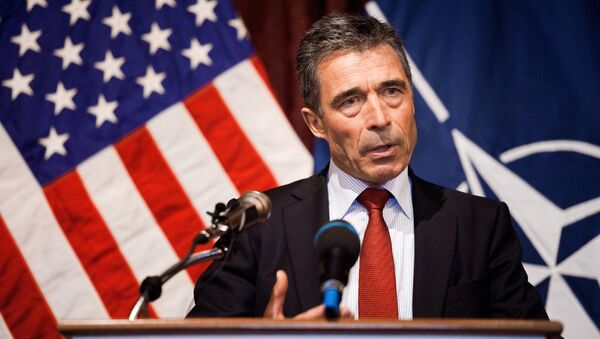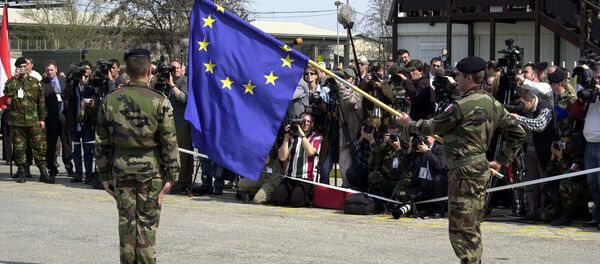European foreign ministers meeting in Brussels Monday (November 14), are still reeling from the outcome of the EU presidential election which saw Donald Trump beat the odds and win — unleashing deep uncertainties over the political, economic and security ties between the European Union and the US.
“I look forward to welcoming Mr #Trump to Brussels for the #NATO Summit next year” — #NATO SG @jensstoltenberg pic.twitter.com/z9aoKlQyYP
— Oana Lungescu (@NATOpress) November 9, 2016
Militarily speaking, the role of NATO has been a central issue in the campaign to reach the White House, with Trump demanding the European NATO members pay their way, or risk the US not standing by its commitment to come to the aid of any member state in the event of hostile action.
However, Trump has made clear he believes that Europe is not pulling its weight within the alliance and has questioned why the US pays so much into an organization he described in March as "obsolete." He told reporters during his campaign that he rejected the idea that the US should be "the world's policeman."
Rasmussen's comments play into the hands of European Commission President Juncker, who has called for the formation of an EU defense force — known colloquially as the EU army. In his State of the Union speech, November 14, Juncker said: "Europe needs to toughen up. Nowhere is this truer than in our defense policy. The Lisbon Treaty enables those Member States who wish, to pool their defense capabilities in the form of a permanent structured cooperation. I think the time to make use of this possibility is now."
So what's the difference between EU army and NATO? UK expelled from EU army? https://t.co/TcfyEXCiCr
— Ignition4Business (@PaulSammo_Ig4b) October 31, 2016
Europe rationalising wasteful duplication of national defence budgets to boost #NATO is welcomed #BBCtw
— Philip C James (@PhilipCJames) November 4, 2016
Until UK shrieks "No #EU Army!"
That EU army that everyone wasn’t keen on sounds like a good idea now that NATO is essentially voided.
— James O'Malley (@Psythor) November 9, 2016
However, Rasmussen told the BBC, Monday (November 14):
"All this talk about a European army — it's only a paper tiger, in my opinion. In concrete terms, many in the European Union have spoken about creating new headquarters in Brussels. I think what is needed now is more European investment in defense capabilities. We don't need new headquarters."
'End of US-Led World Order'
Rasmussen, October, told Politico magazine:
"What is at stake here is the American role as the global superpower, and if Mr. Trump were to be elected president of the United States, I am concerned it would be the end of the American-led world order."
All NATO members signed up to a deal at the last summit — in Wales, United Kingdom, November 2014 — to spend two percent of each country's GDP on the military. In July, asked by the New York Times lif he would go to the aid of Estonia, Latvia and Lithuania if they were attacked by Russia, Trump said he would only do so if the countries "have fulfilled their obligations to us."
Asked what he would do if countries had not fulfilled their obligations, Trump responded, "Well, I'm not saying if not. I'm saying, right now there are many countries that have not fulfilled their obligations to us."
Meanwhile, the current NATO Secretary General, Jens Stoltenberg, writing in the London Observer, November 13, said: "Going it alone is not an option, either for Europe or for the United States".



